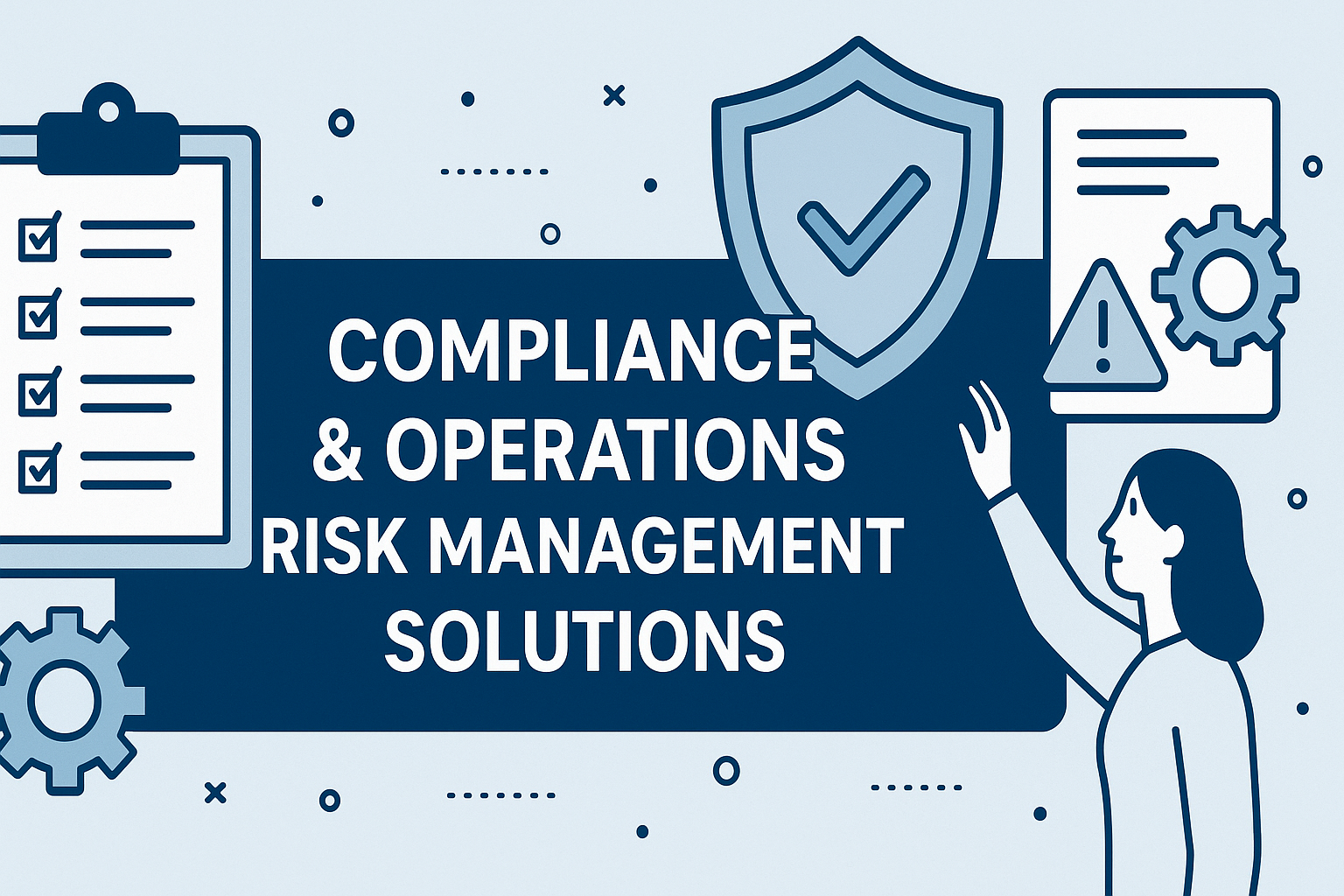In today's fast-paced, highly regulated business world, organizations are confronted by an ever-increasing number of intricate risks. These risks are of unlimited forms, ranging from compliance to business disruption, and, if unmanaged, could be significant roadblocks to business expansion and long-term survival. To a company like "Start An Idea," an emerging or start-up business that wants to establish its own identity in the market, risk avoidance of such a nature is important to ultimate success.
In this report, we introduce the theory of compliance and operational risk management and present practical advice regarding how "Start An Idea" can put and maintain in place effective risk control measures so that it protects its interests as well as complies with the relevant laws.
1. Compliance and Operational Risk Control Understanding
Compliance Risk Definition:
Compliance risk is the possibility of a loss of money, law or regulatory enforcement, or image loss on the part of the company for its failure to fulfil the company's procedures, regulations, or laws. Compliance risk could come in the following forms: abuse of financial reporting, inability to meet the standard of the industry, violation of protection of data, or disregard for environmental law.
For a company such as "Start An Idea," which is active in an emerging economy growing rapidly, non-compliance may result in heavy fines being imposed upon it, damaging the reputation of the company, or business suspension in extreme cases. With companies expanding internationally, heterogeneous regulatory environments at a regional scale are to be faced as well, further complicating compliance.
Operational Risk:
Operational risk, and not trading risk, is a risk of loss as a result of imperfect or poor internal processes, systems, employees, or external events. Human mistakes, equipment breakdown, insider deceit, natural events, or other external interference could trigger such a risk. Operational risks in a start-up could be Himalayan hurdles to normal operations as well as sustainable growth.
Operational risk control is all about identifying, analyzing, and monitoring risks that are most likely to discourage the firm's ability to operate smoothly and efficiently. Compliance risk has traditionally been applied to refer to compliance with norms outside the firm, whereas operational risk control is all about developing a healthy business platform that can go smoothly and offer comfort for smooth operation.
2. The Interface between Compliance and Operational Risk
Compliance and operational risk diverge but cross each other's path. For instance, ineffective operating procedures or mechanical failure can lead to non-compliance, especially in regulated industries. Similarly, non-compliance can lead to operational inefficiency, especially if it brings with it legal troubles, fines, or reputation loss.
For example, if "Start An Idea" does not invest in data protection systems that will cater to the compliance needs of GDPR or any other compliance of a privacy regulation, then it will be forgoing revenue (compliance risk) and experience business disruptions (operational risk) as it attempts to bridge the gap. There, therefore, must be a call to the viability of business that there must be an overlord risk management for the compliance risks and the business risks.
3. Principles for Controlling the Risks of "Start An Idea"
3.1. Risks Identification
For purposes of controlling the compliance as well as the operation risks, "Start An Idea" must incorporate the following principles:
Risk control begins with risk identification. It entails conducting a comprehensive examination of business activities, perception of the external business environment, and review of the regulatory landscape.
For a startup, it would entail:
- Awareness of industry regulation: Research the applicable local, national, and international laws that govern your business. If your business is tech-focused, data protection laws like GDPR or CCPA would be of concern.
- Business process review: Review all from human resources to way through to IT infrastructure procedures to supply chain management to define vulnerabilities.
- Consultation with stakeholders: Talk to employees, industry specialists, and consultants to get a complete picture of possible risks.
3.2. Risk Assessment and Prioritization
Having outlined risks, the second is to assess their potential impact and probability. This allows businesses to prioritize resources to the most applicable threats.
"Start An Idea" can:
- Categorize risks: Divide risks into categories (e.g., regulatory, operational, financial) in order to make them more manageable and evaluate.
- Estimate probability and impact: Assign each risk a score on a scale (e.g., low, medium, high) to estimate its probable impact on the business.
- Risk register: Have a record that lists identified risks, status, and mitigation steps.
3.3. Implementation of Mitigation Measures
Proper mitigation strategies are different depending on the nature of the risk. For compliance risks, for example, it could be regulatory and legal compliance ensuring, and for operational risks, it could be process streamlining or enhanced technology.
The following can be used in "Start An Idea" for mitigation:
Compliance Mitigation:
- Preparation and recurring reviews and audits to verify adherence to relevant legislation.
- Putting and enforcing a compliance program with the help of properly written policies and employee training.
- Legal or compliance professionals support to ensure familiarity with the changing laws and regulations.
Decreasing operational risk:
- Improved internal controls: Create strong internal processes to minimize human error and fraud.
- Business continuance planning: Create recovery planning in scenarios of operations shutdown such as data breaches and natural disasters.
- Technology solutions: Invest in secure and reliable technology infrastructure and technology equipment to lower threats based on technology failure.
3.4. Monitoring and Reporting
Regular checks should be carried out after implementing the risk mitigations. Monitoring of the risk factors on a regular basis provides early warning of risks to the companies so that they can respond ahead of time.
For "Start An Idea," this would mean:
- Having a risk monitoring system: Track risks, compliance rate, and performance promptly via software.
- Reporting procedures: Specific reporting channels by which employees can report operational or compliance irregularities.
- Internal and external audits: Third-party and internal audits periodically ensure risk control measures function efficiently.
3.5. Employee Awareness and Training
Human error is one of the basic causes of compliance and operating risks. "Start An Idea" must make a huge investment in long-term training programs such that all its employees have some idea about the risk management policy and their role in making the risks zero.
Important features of an ideal training program include:
- Compliance training: Educate employees on pertinent legislation and regulations, and why employees must comply with company policy.
- Operational training: Employee training for their role during regular business, security procedures, and emergency procedures.
- Periodic updates: Regular retraining to acquaint the employees with emerging threats and countermeasures.
3.6. Building a Risk-Informed Culture
A culture of risk awareness within the organization facilitates collective ownership of handling risk. Leadership is invoked in "Start An Idea" to take a lead step by putting the spotlight at all levels within the organization to address risk.
For setting up a risk-aware culture:
- Leadership commitment: Top management needs to be committed to risk control programs and risk management needs to be part of corporate objectives.
- Transparency and communication: Support open communication of risks and provide employees with protection to report their concerns without the fear of revenge.
- Continuous improvement: Periodically review risk control programs and modify them in line with new data, experience, or altered circumstances.
4. Compliance to Regulations in a Start-up Environment
Legislative compliance is a top priority in any new venture. Compliance is awfully hard to maintain for start-ups, though, since they have no funds and need to grow rapidly.
Some of the most significant ones to "Start An Idea" are:
- Regulations particular to an industry: Depending on whether it is healthcare, finance, or technology, there can be a requirement to follow industry-specific regulations (e.g., HIPAA for healthcare).
- Data protection policies: Data privacy laws are of utmost importance, especially for companies that involve customers' data. GDPR, CCPA, etc. call for strict data handling and transparency.
- Global expansion: The company can now venture into new geographies with alternative regulation models. Compliance with overseas laws (tax laws, labour laws, or environmental laws) will be mandatory.
5. Conclusion: The Way Ahead for "Start An Idea"
For "Start An Idea," operation and compliance risk is a process of iterative guidance, flexibility, and vision of what the future will be. With probably the likely risks on the horizon, being good at making mitigation plans and anticipating risk and compliance gives the company not only a circumvention of expensive breakouts but also builds the platform for long-term expansion.
Sound risk management is not only ensuring the well-being of the business is not compromised but also a setting where innovation and operational efficiency can thrive, thus resulting in long-term success. With an effective strategy, "Start An Idea" can be assured that its operation will be compliant, its risks adequately managed, and its growth trajectory aligned.
Also Read: Merger vs Acquisition Difference






